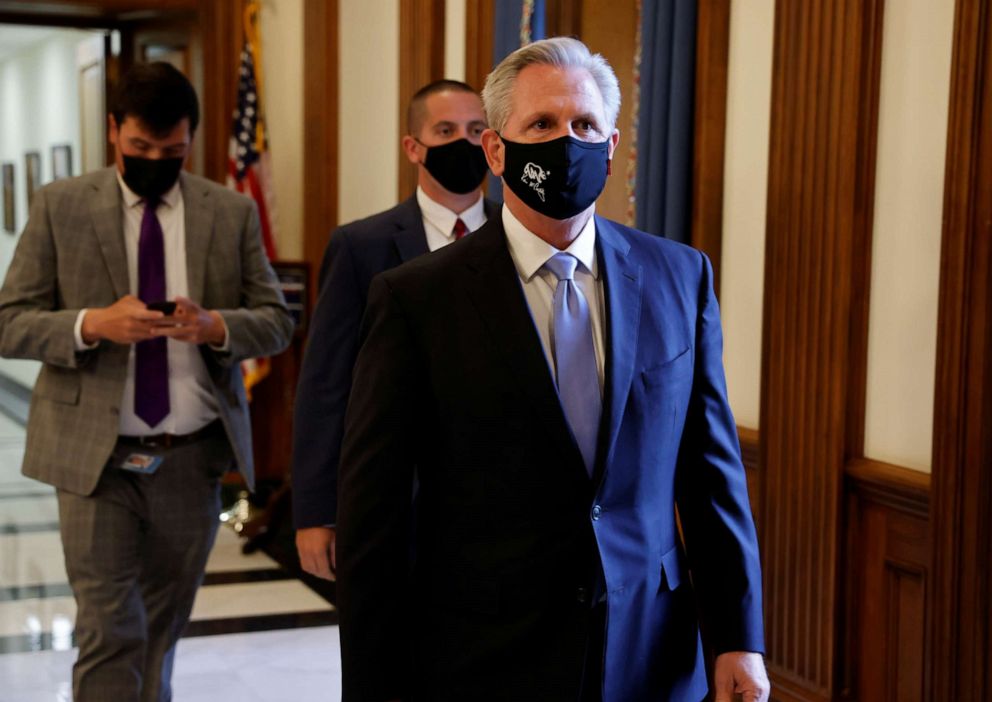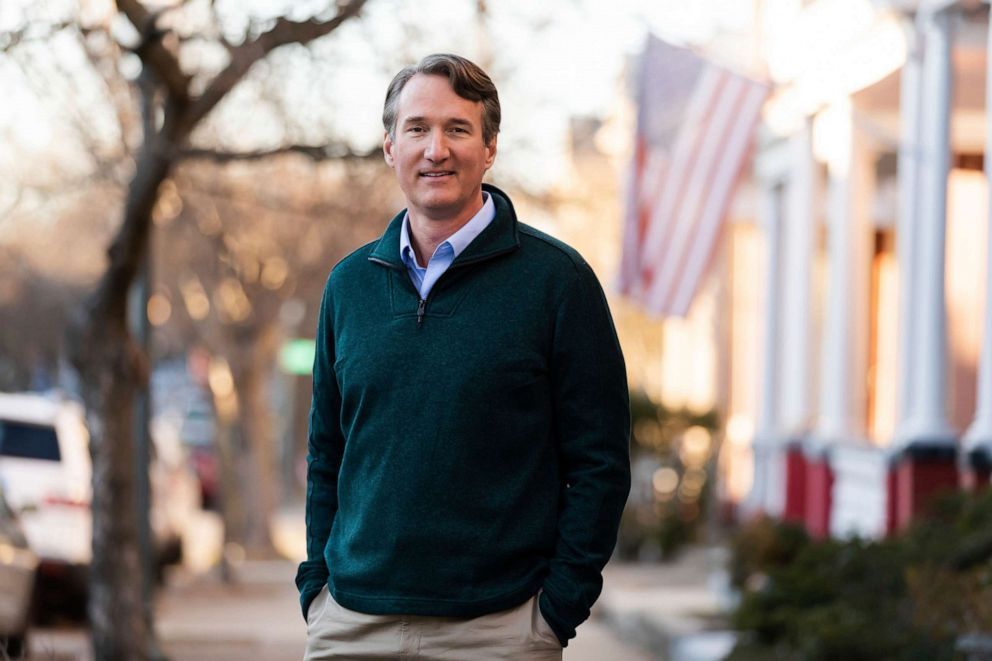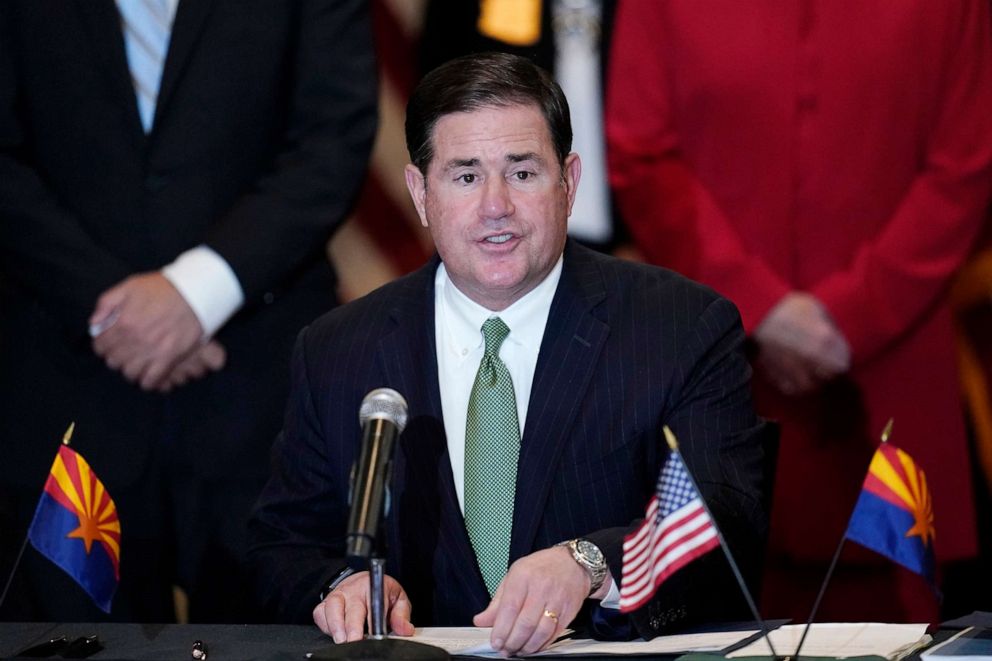Cheney looms larger for GOP on eve of ouster: The Note
This episode illustrates how leaders' loyalty to Trump will animate their future
The TAKE with Rick Klein
It will be a secret ballot that conceals nothing -- and an attempt to look to the future by continuing to talk about a particular episode of the past.
The slow-motion ouster of Rep. Liz Cheney from House Republican leadership will almost certainly culminate in a vote Wednesday morning that would pave the way to make Rep. Elise Stefanik, R-N.Y., the House conference chair instead of Cheney, R-Wyo. -- assuming Stefanik fends off late-mounting concerns among conservatives.

But even if this is a sign that former President Donald Trump has already won the GOP's civil war, the episode illustrates how party leaders' loyalty to the former president will continue to animate their future.
Start with Cheney herself, whose Washington Post op-ed framed the coming vote as a "turning point" for the party she knows well: "Republicans must decide whether we are going to choose truth and fidelity to the Constitution," she wrote.
Taking to the House floor Tuesday night, Cheney hinted at the role she could play from here, even as she seems resigned to her fate: "I will not sit back and watch in silence while others lead our party down a path that abandons the rule of law and joins the former president's crusade to undermine our democracy."
Cheney has already made clear that she is watching House Minority Leader Kevin McCarthy, who also gets his first meeting with President Joe Biden on Wednesday but whose battle to become speaker, if Republicans take the House next year, has barely begun.

Plus, as Cheney said Tuesday on the House floor, Trump “risks inciting further violence” by continuing his false and misleading claims. That's a theme that will get additional airing at separate Capitol Hill hearings Wednesday, with testimony from former Trump and current Biden administration officials.
Cheney will almost certainly be out of leadership, and Trump will call it a win for his loyalists. But she won’t be going away -- and neither will the very real concerns she’ll bring to national politics for some time.
GOP House members and senators keep saying they want to talk about the future, yet this is an issue with a resonant and relevant past.
The RUNDOWN with Alisa Wiersema
Businessman Glenn Youngkin's victory in the Republican gubernatorial primary in Virginia was solidified on Tuesday with an endorsement from Trump. But the most notable support for the endorsement came from Democrats who cheered on the move from the former president.
"And with that, Trump just helped us define Glenn Youngkin on Day 1 of #VAGov general election," tweeted Marshall Cohen, who serves as political director of the Democratic Governors Association.
Democrats have yet to determine their nominee, but at least two hopefuls -- former Gov. Terry McAuliffe and state Sen. Jennifer McClellan -- weighed in to question the efficacy of the endorsement and note that Trump lost the state of Virginia in the fall. Biden won the commonwealth by about 10 points -- 54% to Trump's 44% -- and even improved on Hillary Clinton's 2016 lead against Trump by about four points.

It remains to be seen whether Trump's endorsement boosts Youngkin's general election campaign in an off-cycle election year, and whether Republicans can use Virginia's matchup as a springboard to build a counterreaction to the outcome of the 2020 presidential election.
In the meantime, Democrats appear to be united at all levels of government in voicing concerns over the looming impact of Trumpism across the aisle. On Tuesday, Senate Majority Leader Chuck Schumer even praised the embattled House conference chair.
"Liz Cheney spoke truth to power. And for that, she's being fired," Schumer said.
The TIP with Quinn Scanlan
The trend of Republican governors signing restrictive voting legislation in unconventional ways continued Tuesday with Arizona's Doug Ducey releasing a video announcing he'd sign a bill approved in the legislature not even an hour earlier.
While less comprehensive than the bills enacted by Gov. Brian Kemp, who signed Georgia's sweeping new election law behind closed doors shortly after it was passed in March, and Gov. Ron DeSantis, who signed Florida's bill live on Fox & Friends last week, the Arizona legislation targets mail voting, too.

The permanent early voter list, which Arizonans can sign up for to automatically receive a mail ballot every election, is effectively no more. Everyone on the list who doesn't vote an early ballot at least once over four years will receive a notice of removal; if they don't respond within a specified time, they'll be purged.
President Pro Tempore Vince Leach, a Republican, said the change won't result in voters being removed, but rather "non-voters" who, unless they're dead or moved, "have elected not to participate" -- sparking backlash from his Democratic colleagues.
"Voting regularly? Seriously? You're really trying to shame voters?" state Sen. Juan Mendez said, calling out Leach by his district. "Are we checking if concealed carry people still want their Second Amendment rights if they don't find enough bullets every year? ... This bill looks like nothing more than a ruse to disenfranchise voters that you don't like."
THE PLAYLIST
ABC News' "Start Here" podcast. Wednesday morning's episode features ABC News Chief Washington correspondent Jonathan Karl, who previews Wednesday's vote on Rep. Liz Cheney's GOP leadership position. ABC News' Matt Gutman joins us from Israel, where rockets continue to rain down near Jerusalem. And ABC News Chief Business & Economics correspondent Rebecca Jarvis explains why fears of a gas shortage stemming from the Colonial Pipeline cyberattack are likely overblown. http://apple.co/2HPocUL
WHAT YOU NEED TO KNOW TODAY
Download the ABC News app and select "The Note" as an item of interest to receive the day's sharpest political analysis.
The Note is a daily ABC News feature that highlights the key political moments of the day ahead. Please check back tomorrow for the latest.




